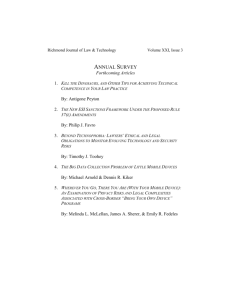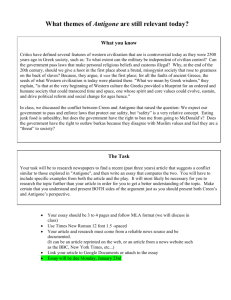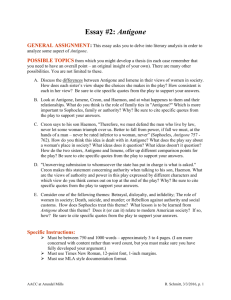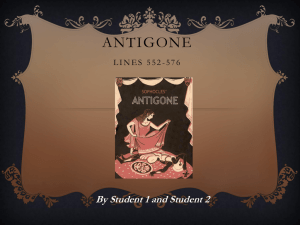The narrative role of suicide in Sophocles` "Antigone" and
advertisement
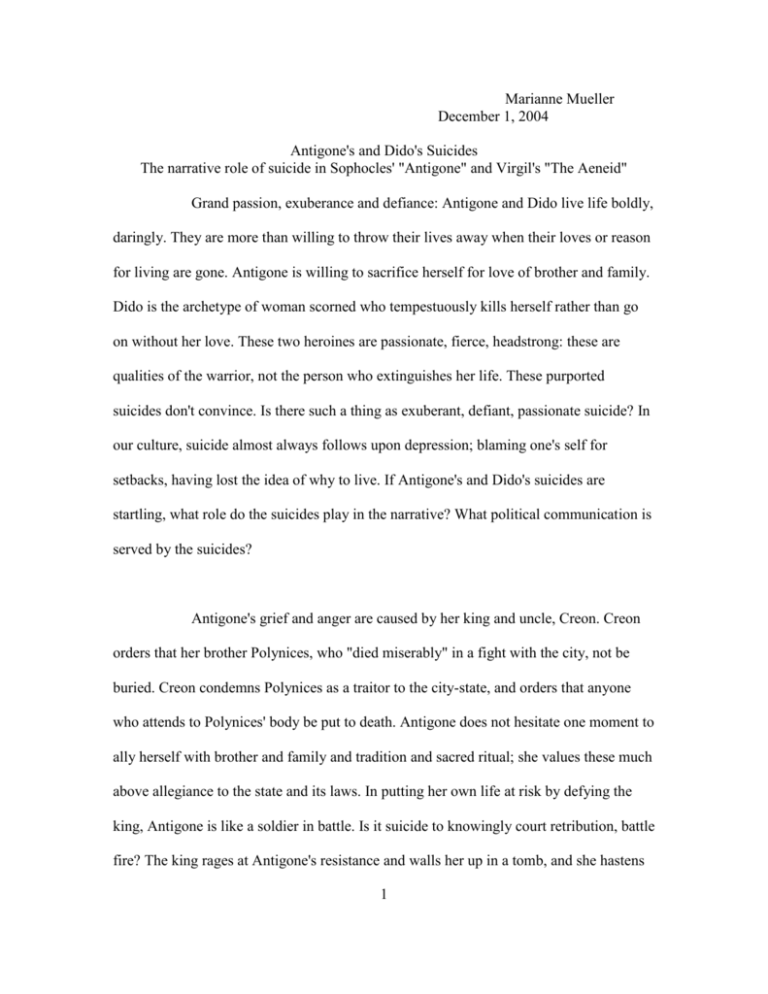
Marianne Mueller December 1, 2004 Antigone's and Dido's Suicides The narrative role of suicide in Sophocles' "Antigone" and Virgil's "The Aeneid" Grand passion, exuberance and defiance: Antigone and Dido live life boldly, daringly. They are more than willing to throw their lives away when their loves or reason for living are gone. Antigone is willing to sacrifice herself for love of brother and family. Dido is the archetype of woman scorned who tempestuously kills herself rather than go on without her love. These two heroines are passionate, fierce, headstrong: these are qualities of the warrior, not the person who extinguishes her life. These purported suicides don't convince. Is there such a thing as exuberant, defiant, passionate suicide? In our culture, suicide almost always follows upon depression; blaming one's self for setbacks, having lost the idea of why to live. If Antigone's and Dido's suicides are startling, what role do the suicides play in the narrative? What political communication is served by the suicides? Antigone's grief and anger are caused by her king and uncle, Creon. Creon orders that her brother Polynices, who "died miserably" in a fight with the city, not be buried. Creon condemns Polynices as a traitor to the city-state, and orders that anyone who attends to Polynices' body be put to death. Antigone does not hesitate one moment to ally herself with brother and family and tradition and sacred ritual; she values these much above allegiance to the state and its laws. In putting her own life at risk by defying the king, Antigone is like a soldier in battle. Is it suicide to knowingly court retribution, battle fire? The king rages at Antigone's resistance and walls her up in a tomb, and she hastens 1 her end by hanging herself. This is not the suicide of a depressed person - Antigone is not depressed, she's on fire. She hasn't lost the idea of a reason to live. She clings to it tightly, her love for her brother, and in fact clings to him so much she follows him into death. The role of Antigone's suicide is not to convince us that she killed herself, but to show us people will follow ancient patterns of family and ritual before paying obeisance to the state. This is underscored by the suicide deaths of the king's son who is Antigone's betrothed, and of the king's wife. Both are overcome with grief at the news of the death of a loved one; personal love and family relationships matter far more than affairs of state. All three suicides tell us love outweighs loyalty to the state, although the ferocity and speed of the suicides does not match our cultural models of suicide. Antigone is not the mourner who hangs herself to end the pain; she is the warrior who seems to live on, fighting, and still causing ripple effects. Virgil tells us a simpler narrative for Dido's suicide: the lover betrayed hurls herself into death. Her lover, Aeneas, blunders into the Queen's realm, his fleet all but destroyed. Aeneas' goddess mother Venus mysteriously sends her son Cupid to prick Queen Dido's heart and inflame her with passion for Aeneas. This quirky divine intervention in Aeneas' progression toward his destiny in Italy works all too well. Queen Dido's affairs of state start to crumble, and Aeneas has forgotten he is supposed to be founding an empire in another land. Jove sends Mercury to bring Aeneas to his senses. Aeneas is to rebuild his ships and launch forthwith. Aeneas abandons Dido without a second thought, but his attempts to steal away quietly don't have a chance of succeeding. Dido cannot believe the abandonment. She has another complaint: she tells Aeneas that if 2 he at least left her with a child, she would have something to remember him by, but no, he has not done even this. She considers their love not to be a secret affair, but a marriage. When it's clear Aeneas is going and nothing will dissuade him, Dido, full of anger and despair and shock, climbs a pyre, falls on a Dardan sword, and awaits conflagration. Aeneas is of the Dardans. Here again, the heroine is as far from depressed as can be: she is raging, wild, angry, determined. Despite being queen of Carthage and bound by duty to her people, the only thing she can see is the form of Aeneas leaving. Like Antigone's, Dido's suicide affirms that blood passion trumps civic duty. And again like Antigone's, Dido's suicide does not come across as a wholly plausible suicide (in our cultural frame of reference. Who have we heard of who really killed herself for love?) Antigone's and Dido's suicides operate more as political communication than as a rational or believable suicide of someone in despair. They say: I will fight, I will not give in, I will not accept what is decreed. The two heroines are full of life, directing their lives, taking charge, taking the offensive. Antigone's death is so forceful it causes a ripple effect of two more suicides, which affirm the same message of fighting back. This evokes the image of the suicide bomber of our day. The suicide bomber is full of passion and burning to fight. He is angry and righteous and defiant. He believes he will carry on holding the divine thread of life into the next world. He is not a depressed suicide; he is an exuberant suicide, like Antigone and Dido. The suicide bomber's allegiance is tribal (even if to a very large tribe), not to any state. He asserts the primacy of the tribe over the state. The similarity breaks down when considering motivation, as neither Antigone nor Dido consciously set out to lash out at anyone. But the political message is the same: the first-order allegiance of lover, of family, of tribe, of tradition, of ritual will always take precendence over second-order abstractions of state and civic duty. The tribe throbs, and the state is by definition apart. Perhaps one conclusion that can be drawn from this message is that states can only succeed to the extent they allow the tribe to be a tribe, the family to be a family, for the individual's definition of tribe and family. 3


